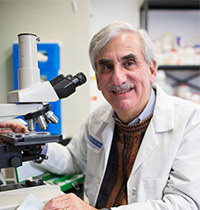

FULL STORY
Colon Cancer Biology, Two Ways
Americans have a 1 in 20 lifetime risk of developing colorectal cancer. Among cancers affecting both men and women in the United States, colorectal cancer ranks second only to lung cancer as the leading cause of cancer-related deaths. Each year more than 100,000 Americans develop the disease, and more than 50,000 die from it.

Winfried Edelmann, Ph.D.At the Albert Einstein Cancer Center (AECC), investigators with a variety of interests—in genetics, nutrition, immunology, microbiology, metabolism and stem cells—are studying the genetic and dietary factors that drive colorectal cancer and are seeking ways to detect, prevent and treat the disease.
Nineteen of these investigators are members of the cancer center's Biology of Colon Cancer Program. Leonard Augenlicht, Ph.D., has led the BCCP since its inception in 1995.
"We know quite a lot about the genetics of colorectal cancer development from studying people at high risk because of an inherited susceptibility," says Dr. Augenlicht.
Genetic Accidents
For example, Lynch syndrome (formerly called hereditary nonpolyposis colorectal cancer) occurs because people inherit mutations in DNA mismatch repair genes—a family of crucially important genes responsible for repairing DNA. People with Lynch syndrome have an 80 percent risk of developing colorectal cancer during their lifetimes.
To learn how mismatch repair gene mutations contribute to Lynch syndrome, BCCP member Winfried Edelmann, Ph.D., and his team in the Spatz Family Laboratory for Cancer Research systematically knock out these repair genes in mice to see how each gene's absence affects the animals' susceptibility to cancer. Thus far, Dr. Edelmann's lab has generated knock-out mouse models for 11 members of this gene family—some of the first mouse models ever developed for colorectal cancer. This work is providing important insights that may lead to novel therapies.
For example, Dr. Edelmann has found that the drug rapamycin is able to shrink tumors in mice that lack a DNA repair gene called Msh2. When the drug is withdrawn, the cancer returns in these mice.
"I've never seen anything like it," says Dr. Edelmann, who attributes the cancer resurgence to nests of tumor-promoting stem cells that are resistant to treatment and remain dormant during drug treatment but resume activity when the rapamycin is removed. "That's exciting, because we now have a model in which we can explore how to eliminate these nests of tumor-causing cells," says Dr. Edelmann.
Diet Derailments
While inherited genetic susceptibility is undoubtedly key in causing some cases of colorectal cancer, "for the vast majority of people who develop colorectal cancer—well over 90 percent of cases—diet plays a far greater role than genetics in determining whether someone will develop the disease," says Dr. Augenlicht. Diet's profound effect on colorectal cancer, he adds, "is absolutely clear from studies of human populations and of animals such as cancer-prone mice. That makes sense, since intestinal tissue is obviously in the path of digestion and comes in contact with many dietary components."

Leonard Augenlicht, Ph.D.Dr. Augenlicht has carried out animal studies showing that in response to a Western diet that combines higher fat and lower fiber along with a number of other nutritional risk factors, intestinal cells alter their energy metabolism long before tumors form. "We think this change in energy metabolism is linked to changes in the function of intestinal stem cells and makes the cells more likely to develop into cancer cells," he says.
Another consequence of feeding animals a Western diet is that fewer of the cells formed by intestinal stem cells become secretory cells. These cells produce gel-like secretions that protect intestinal cells from environmental insults. As shown by Einstein's Anna Velcich, Ph.D., mice genetically altered to lack this protective barrier tend to accumulate mutations—and develop tumors.
Inflammation also plays a role in intestinal cancer. Previous research at Einstein found that mice with overactive immune cells called macrophages develop areas of inflammation in their intestines from which tumors later arise. Dr. Augenlicht has carried out studies on the role of inflammation with his colleague Pamela Stanley, Ph.D. The researchers disabled a gene that is key to normal development in mice, leading to animals that developed low-level chronic inflammation. The researchers observed that these mice tended to form intestinal tumors if they were also fed a Western-style diet.
All Connected
The complex web of interactions in this organ—among genes and diet, immune cells and gut microbes—"makes the intestine fascinating to study," says Dr. Augenlicht. But successful research requires teamwork. "The collaborative spirit we have here at the AECC—coupled with our core facilities and institutes dedicated to the study of stem cells and aging, for example—makes for an ideal environment for exploring how different factors interact to generate tumors."
Posted on: Thursday, December 12, 2013

Tablet Blog